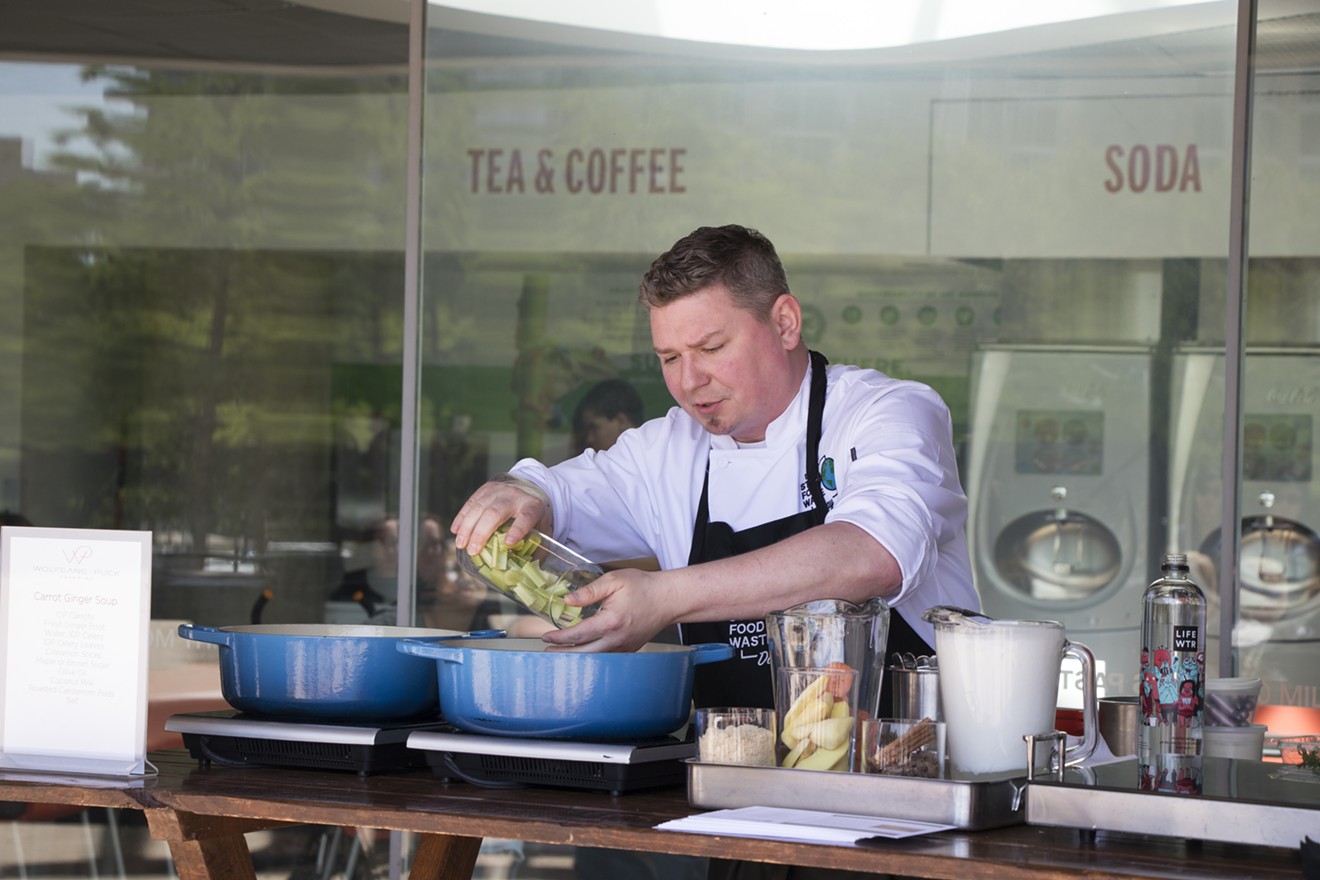Many restaurants aren’t better. Some are, but it’s not enough to counteract the fact that 40 percent of food produced in America is wasted, according to savethefood.com.
The statistic was on a flier handed out Friday at the Perot Museum of Nature and Science, where Compass Group North America hosted its second annual Stop Food Waste Day. The plaza of the Perot was one of the locations across the country with a Waste Warrior Challenge, where chefs hosted demonstrations and a cook-off of dishes with ingredients that result in no waste.
Leading the charge at the local version were Drew Swanson, regional executive chef for Wolfgang Puck Catering, and Patton Robertson, chef de cuisine at Cafe Momentum. Robertson prepared shrimp and grits (which won the taste challenge), and Swanson created carrot-ginger soup.
“The whole food waste issue has caught on. Back in the day, it was food cost. Not anymore,” Robertson says.
Julia Jordan, director of sustainability at Compass Group North America, says greater awareness of waste is a relatively recent trend but one that’s gaining urgency.
“This has definitely been on the Compass radar for at least five years,” she said of the massive food service and support services company. “We were hearing it from different levels. This is obviously something that continues to be an issue.”

Ugly carrots? Make them into a carrot-ginger soup, like Swanson did at Stop Food Waste Day. He used carrot tops as a garnish and used celery leaf, commonly discarded, as an ingredient in the soup.
Taylor Adams
For Chad Houser, executive chef of Cafe Momentum in downtown Dallas, it’s an issue that begins in the dirt.
“We throw away produce that doesn’t even go to market,” he says. “That’s always bugged me so bad.”
There was a time three years ago, he explains, when his team purchased local sweet potatoes, roasted them and put them in a freezer. But the door was left open overnight, which meant the potatoes had to be thrown away.
“I called to apologize and ask for more. They said they had given us the best ones. ... One-half of that field would have been thrown away because it wasn’t perfect,” Houser says. “Produce is left in the ground because it’s not perfect.”
Swanson says that attitude could go a long way toward wasting less.
“I want the openness and willingness to use an imperfect product,” he says. “A very ugly carrot can go into soup or stock.”
Jordan says she tries not to waste any food in her home, something she picked up at a young age.
“There is a learning curve, but it’s talking to your grandparents; it’s how they cooked,” she says. “Just with a little bit of planning and creativity, it’s not hard.”
Jon Stevens, chef and owner of Stock and Barrel in Bishop Arts, says it’s a habit he also carried from his upbringing.
“I think it’s easier to waste food than to actually utilize it in the right ways. … We operate with next to zero waste in the kitchen. We utilize most things, we put everything in its place,” he says. “I grew up in a family that didn’t waste things, and it transferred into my professional life. But it also depends on how it’s trained. I was taught to utilize everything to the nth degree: It stops at the root of the onion.”

Patton Robertson, chef de cuisine at Cafe Momentum, made shrimp and grits. He cooked the bacon first, used leftover bacon fat to cook vegetables and suggested saving shrimp shells to make a stock.
Taylor Adams
“For us, because we’re a scratch kitchen, the curve was when we opened because we have no freezer. You spend the next couple of months getting your [orders] correct,” she says. “We waste virtually nothing because we use it all. … I’d rather be out of something and not sell it than throw it away.”
Recently, the pub stopped selling chicken wings because they weren’t selling enough. It a revenue issue, but the owners also wanted to stop throwing away food.
“That little bit of waste — little bit of this, little bit of that — it adds up to matter at the end of the year,” Jacobus says. “You have to examine it constantly.”
Houser was proud Cafe Momentum was part of Stop Food Waste Day. It’s an issue he thinks should concern everyone involved, from farming to professional cooking to weeknight home cooking.
“Literally, it’s just taking one single step. As silly or frivolous as that sounds, it’s empowering,” he says. “Don’t look at it as a giant puzzle.”
For the restaurant, it’s also meaningful to share the practice of saving and utilizing with the youth employees. As Houser says, it’s good for the environment, but it’s also everyone’s responsibility.
“I’m that much of a tightwad to save 13 cents, but it’s respectful to the farmer who grew the produce,” he says. “We need to be good stewards.”











